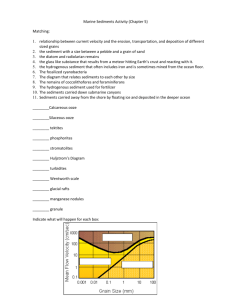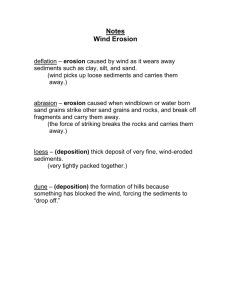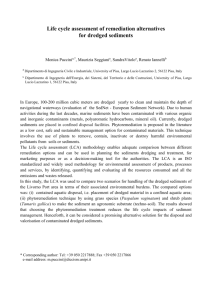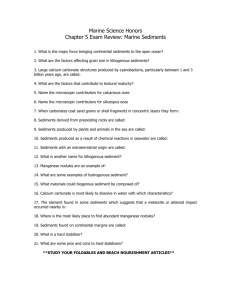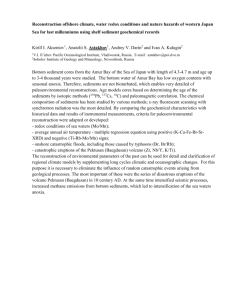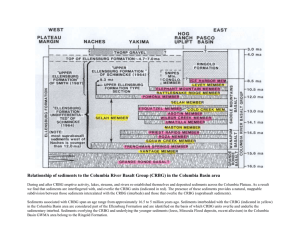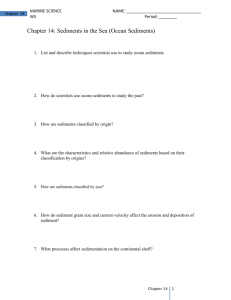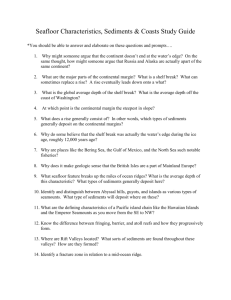Presentazione Progress meeting-10 Settembre
advertisement
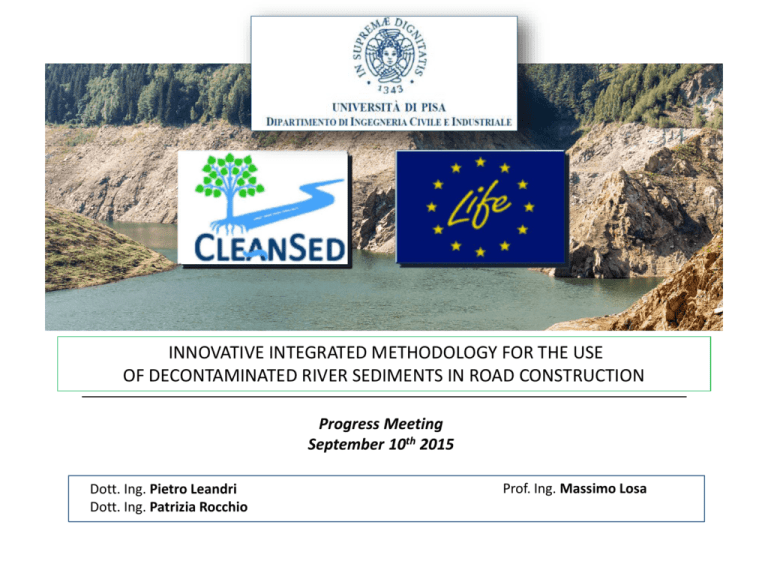
INNOVATIVE INTEGRATED METHODOLOGY FOR THE USE OF DECONTAMINATED RIVER SEDIMENTS IN ROAD CONSTRUCTION Progress Meeting September 10th 2015 Dott. Ing. Pietro Leandri Dott. Ing. Patrizia Rocchio Prof. Ing. Massimo Losa CLEANSED - LIFE 12 ENV/IT/000652 “Innovative integrated methodology for the use of decontaminated river sediments in plant nursing and road construction” ACTIONS B. Implementation actions ACTION B.4: Demonstration of the use of decontaminated sediments in road construction Specific technical goals : - preliminary assessment of the optimum percentage of lime for the stabilization of sediments to be used in the construction of the road section; -construction of a road section for the demonstration of the use of sediment mixtures in the construction of low volume roads. C. Monitoring of the impact of the project actions ACTION C.3: Monitoring and validation of the use of decontaminated sediments for road construction Murcia - September 10th, 2015 CLEANSED - LIFE 12 ENV/IT/000652 “Innovative integrated methodology for the use of decontaminated river sediments in plant nursing and road construction” ACTION B.4 1stStep : Treatment of the dredged sediments Main problem: excessive water content (that do not allow dredged sediments to ensure appropriate bearing capacity). It is necessary to reduce the water content at least up to 15-20%. In situ procedure: 30 cm lime layer was laid on a draining material and rehashed mechanically in order to allow the air-drying. Laboratory procedure: realization of dewatering system for moisture control The sediment samples were tested periodically to check the variation of water content as a consequence of natural drying in order to assess the amount of water that the system naturally loses by evaporation and / or drainage. reproduced in a reduced scale: Environmental temperature and moisture conditions: no rain and/or direct radiation almost constant temperature (20°C) Field conditions : lower drainage lateral confinement surface aeration Murcia - September 10th, 2015 CLEANSED - LIFE 12 ENV/IT/000652 “Innovative integrated methodology for the use of decontaminated river sediments in plant nursing and road construction” ACTION B.4 1stStep : Treatment of the dredged sediments Dewatering system for moisture control TOP MIDDLE BOTTOM Murcia - September 10th, 2015 CLEANSED - LIFE 12 ENV/IT/000652 “Innovative integrated methodology for the use of decontaminated river sediments in plant nursing and road construction” ACTION B.4 1stStep : Treatment of the dredged sediments Dewatering system for moisture control: Results 55.0 Water content (%) 50.0 Top 45.0 Middle 40.0 Bottom Poli. (Mean value) 35.0 30.0 0 10 20 30 40 50 60 70 Time (days) In controlled environmental conditions, the moisture content can be reduced up to 40% after a period of 7-8 weeks Murcia - September 10th, 2015 CLEANSED - LIFE 12 ENV/IT/000652 “Innovative integrated methodology for the use of decontaminated river sediments in plant nursing and road construction” ACTION B.4 1stStep : Treatment of the dredged sediments Dewatering system for moisture control: Results Remarkable difference between the in situ and laboratory processes: in situ environmental conditions cannot be controlled similarly to the laboratory process, after dewatering the sediments showed a water content of about 40 % after 5-6 weeks. the level is still too high to allow the sediments workability in order to reduce the water content and the dewatering process time, the partially dewatered sediments were mixed with lime Lime hydration process decreases the soil moisture content. CaO + H2O = Ca (OH) 2 + 15.5 kcal The reaction is exothermic and heat generated from this chemical reaction further dries wet sediments by driving it off as steam. Murcia - September 10th, 2015 CLEANSED - LIFE 12 ENV/IT/000652 “Innovative integrated methodology for the use of decontaminated river sediments in plant nursing and road construction” ACTION B.4 1stStep : Treatment of the dredged sediments In order to reduce the water content up to the level required for compaction, dredged sediments were mixed in laboratory with different lime percentages and the related water loss was evaluated. Murcia - September 10th, 2015 CLEANSED - LIFE 12 ENV/IT/000652 “Innovative integrated methodology for the use of decontaminated river sediments in plant nursing and road construction” ACTION B.4 1stStep : Treatment of the dredged sediments Lab stabilization results: %CaO versus water content The optimum water content of about 20%, determined by the Proctor compaction curve was obtained by using a lime percentage greater than 15%. Murcia - September 10th, 2015 CLEANSED - LIFE 12 ENV/IT/000652 “Innovative integrated methodology for the use of decontaminated river sediments in plant nursing and road construction” ACTION B.4 Conclusion : Road construction in order to reduce the water at a value near to Proctor moisture optimum level (19%), the lime percentage required for the stabilization (5.2%) is increased up to 15%. Double effect : stabilization of the sediments and drying Dredged sediments dryed and stabilized with lime Murcia - September 10th, 2015 CLEANSED - LIFE 12 ENV/IT/000652 “Innovative integrated methodology for the use of decontaminated river sediments in plant nursing and road construction” ACTION B.4 Completed with road construction Murcia - September 10th, 2015 CLEANSED - LIFE 12 ENV/IT/000652 “Innovative integrated methodology for the use of decontaminated river sediments in plant nursing and road construction” ACTION C.3 1stStep : Field investigation Each layer was laid only after the situ performance check of the layer to be covered. The following parameters were monitored in situ: moisture content of dredged sediments stabilized with lime (BS 6576); field density of dredged sediments stabilized with lime was measured after compaction by the sand-cone apparatus (CNR BU n. 22/72); elastic Modulus of compacted layers by using the static and dynamic plate load tests (B.U. C.N.R. n. 146/1992, ASTM E2835–11; ASTM E2583–07 (2011) ); this parameter is a good indicator of the bearing capacity of the embankment; In-situ and laboratory CBR index (ASTM D6951-03, UNI EN 13286-47:2012 ); full characterization of the asphalt mix (volumetric and mechanical characteristics) Murcia - September 10th, 2015 CLEANSED - LIFE 12 ENV/IT/000652 “Innovative integrated methodology for the use of decontaminated river sediments in plant nursing and road construction” ACTION C.3 1stStep : Field investigation Dynamic load plate test Field density Static load plate test Dynamic Cone Penetrometer (DCP) test - CBR in situ test In situ tests on asphalt binder mixture by using a Mobile Laboratory Murcia - September 10th, 2015 CLEANSED - LIFE 12 ENV/IT/000652 “Innovative integrated methodology for the use of decontaminated river sediments in plant nursing and road construction” ACTION C.3 Settlements monitoring In order to evaluate the behavior of the embankment under working conditions, a magnetic extensometer system for monitoring settlements over time was installed Installation of extensometer system Murcia - September 10th, 2015 CLEANSED - LIFE 12 ENV/IT/000652 “Innovative integrated methodology for the use of decontaminated river sediments in plant nursing and road construction” ACTION C.3 Settlements monitoring Sounding manhole The monitoring activities will be completed through the measurement of settlements over time in order to evaluate the behavior of the embankment under working conditions (traffic loads) Murcia - September 10th, 2015 CLEANSED - LIFE 12 ENV/IT/000652 “Innovative integrated methodology for the use of decontaminated river sediments in plant nursing and road construction” ACTION C.3 Settlements monitoring The monitoring activities will be completed through the measurement of settlements over time in order to evaluate the behavior of the embankment under working conditions (traffic loads) Murcia - September 10th, 2015
